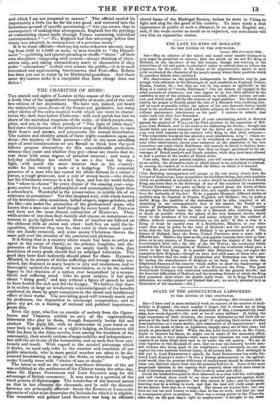THE CHARITIES OF MUSIC.
THE sounds and sights of London at this season of the year convey a lively idea of the magnificent hospitality of music, and of the end- less retinue of her dependants. We have not, indeed, yet heard the melancholy canto fermo of the frozen-out gardeners, nor many other ditties of the extra-musical world which are wont to charac- terize the dark days before Christmas : still, each parish has had its share of the nocturnal eruptions of the waits ; of which people com- plain, and yet, in the vilest parody of " The light of other days," find some reminiscence of the primitive song of Bethlehem, to open
their hearts and purses, and perpetuate the annual disturbance. The sudden and stealthy attack of these night-wanderers upon our
sleep—the mystery of their presence—(for in the most unwilling state of semi-consciousness we are 'iced to think bow the poor fellows prepare themselves for this uncomfortable profession, whence they come and whither they go)—these are causes that in- vest them with some degree of personal interest ; and many a holyday schoolboy has waited to see a live wait by day- light, with much the same interest that in his country- walks he has viewed a mole or a hedgehog. The corporeal presence of a man who has vested his whole fortune in a cornet a piston, a rough greatcoat, and a pair of strong boots—who drinks out his Christmas revenue in a few days, and has the world before him "where to choose" for every dinner of the ensuing year—sug- gests matter for a more philosophical and contemplative head than a schoolboy's. Wonderful is the preservation to middle life of an existence so precarious ! Yet this despised wait, with whole hordes of his brethren—ship-musicians, ballad-singers, organ-grinders, and the like—are under the protection of the goodnatured muse, who knows that a man can eat beef though he never heard of PEPIISCH and have not the most distant conception of MARPITEG. Thus, while artists of one class feed daintily and repose on sumptuous ot- tomans in gayly-lighted saloons, those of another are billeted on the alehouse with an onion and crust : both live on until the in- equalities, whatever they may be, that exist in their actual condi- tion are finally removed, and some snowy Christmas throws the same pall over the remains of the patrician and plebeian. It is fitting that in a country where music has been so active an agent in the cause of charity, as the prisons, hospitals, and dis- pensaries of the United Kingdom can amply testify in this, that musicians of every grade should find an enlarged toleration. The good they have done indirectly should plead for them. HANDEL'S Messiah, in its picture of divine sufferings and wrongs meekly sus- tained, has disposed so many hearts to pity and tenderness, and so thoroughly opened the sluices of benevolence, as to be the noblest legacy to the charities of a nation ever bequeathed by a sympa- thetic and suffering mind. Like its great subject, it has gone about " doing good," and may without a figure of speech be said to have healed the sick and fed the hungry. We believe that there is in society at large an involuntary acknowledgment of the benefits conferred on them by great composers in the moral and intellectual effect of their works. The prevailing good-will towards music and its professors, the disposition to encourage composition, and to place the art on a footing of national and political importance, prove this. Even the poor, who live on crumbs of melody from the Opera- house and Theatres, exhibit no envy of the vagabondizing itinerants who play to them, though frequently better fed and clothed. The gipsy life, with an instrument io your band or at your back to gain a dinner or a night's lodging, as GOLDSMITH did with his flute in the Alps, revolts, even among the humblest of the community, their sturdy notions of respectability and independence ; but still the art is one of the humanities, and as such free from con- tumely and insult. With regard to the monied patronage which it draws, we need only refer to the number and condition of our public minstrels, who in more genial weather are often to be dis- covered breakfasting at large in the fields, or stretched at length under friendly trees with " choice of sun or shade." The latest as well as the newest beneficent direction of the art was exhibited at the settlement of the Chinese treaty the other day, when Sir HENRY POTTINGER and Lord SALTOUN sang for the advantage of British commerce. It may soon he a question of the vocal powers of diplomatists. The researches of the learned assure us that in hot climatexrthe chromatic and in cold the diatonic harmony are principally affected : hence the RUBINI or LABLACHE character of voice must determine the latitude for which it is eligible. The venerable and gallant Lord SALTOUN was long an efficient
choral basso of the Madrigal Society, before he went to China to fight and sing for the good of his country. To have made a first appearance in public at such a distance, is an sera in English art ; and, if the trade revive as much as is expected, our merchants will owe him an equestrian statue.






























 Previous page
Previous page